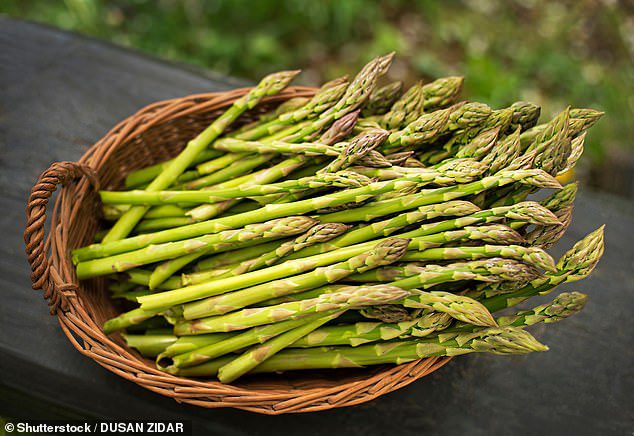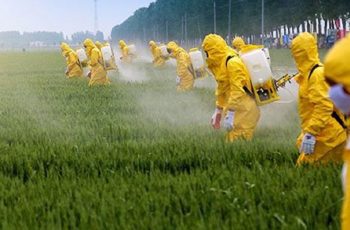Cancer growth can be slowed with prebiotic foods such as asparagus and onion, a study on mice suggests.
Prebiotics are a group of compounds that help boost the variety of gut bacteria and are also found in garlic, leeks, and bananas.
Scientists fed mice water infused with prebiotics and studied how the rodents fought melanoma skin cancer, one of the aggressive forms of the disease due to its ability to spread to so many organs.
For the first time, research showed how prebiotics populated the gut, which bolstered the immune system.
With more immune cells attacking cancer, the disease progression was curbed, the researchers said.
They believe prebiotics holds the potential to make ‘cutting-edge cancer treatments’ once studies on humans are conducted.

Cancer growth can be slowed with prebiotic foods such as asparagus and onion by boosting killer immune cells, a study on mice suggests
Dr. Ze’ev Ronai, the senior author of the study published in Cell Reports, said: ‘Earlier studies have demonstrated that prebiotics limit tumor growth, but until now the mechanism by which they do so has been unclear.
‘Our study shows for the first time that prebiotics limit cancer growth by enhancing anti-tumor immunity.’
The composition of our gut microbiota is partly determined by our genes but can also be influenced by lifestyle factors such as our diet.
Probiotics, which are live microorganisms, may benefit your health by changing the overall composition of the microbiota. They are found in a range of natural food sources, particularly fermented foods such as kefir.
Prebiotics, on the other hand, are ‘food’ for probiotics in the gut. They are not live organisms, but they help probiotics stimulate the growth of diverse gut populations.
Researchers at Sanford Burnham Prebys Medical Discovery Institute in California analyzed the prebiotic inulin.
Inulin is a fiber found in plants like asparagus, onion, chicory, and artichokes.
The researchers embarked on a series of studies that involved feeding healthy mice inulin in their chow.
Then they transplanted melanoma cancer cells into the mice to determine the effect of the prebiotic.
First, the team found the population of bacteria in the gastrointestinal tract, called gut microbiota, altered. This was driven by inulin.
Anti-tumor immunity was kickstarted, measured by how many white blood cells had infiltrated the tumor cells.
This indicated that the prebiotics enhanced the immune system’s ability to attack cancer.
Growth of melanoma – the most common type of skin cancer – was slowed as a result.
The researchers wanted to look at other cancers other than melanoma. They found the growth of colon cancer cells was also inhibited by inulin feed.
Co-author Dr. Scott Peterson, professor of microenvironment and cancer immunology, said: ‘Prebiotics represent a powerful tool to restructure gut microbiomes and identify bacteria that contribute to anti-cancer immunity.
‘The scientific advances we are making here are getting us closer to the idea of implementing prebiotics in cutting-edge cancer treatments.’
Some of the most exciting findings were in mice with NRAS mutations, found in around 20 percent of melanoma patients.
NRAS-mutant melanoma has poorer outcomes, and tumors often become resistant to drugs called MEK inhibitors.
The study found mice carrying NRAS-mutant melanoma that received inulin were able to delay the development of resistance to treatment with an MEK inhibitor.
Dr. Jennifer Wargo, professor at the University of Texas MD Anderson Cancer Center, said: ‘Immunotherapies and targeted treatments such as MEK inhibitors are helping people with melanoma, but not everyone.
‘While some patients respond to therapy, others do not. In addition, many patients develop resistance to treatment which requires alternate medicine combinations.
‘Manipulating the microbiome with prebiotics might be a helpful addition to current treatment regimens, and today’s finding should be further tested in independent models and systems.’
Dr. Ronai, a professor of tumor initiation, cautioned that these findings require much more study before considering any evaluation in people with cancer.
He said: ‘Our findings are a step forward in our understanding of how certain prebiotics affect tumor growth, but we are far from applying these to humans.
‘Future studies need to be conducted in more complex animal models of different genetic backgrounds and ages to address the complex nature of human tumors before we may consider evaluating this prebiotics in people.’
If you know someone who might like this, please click “Share”!




